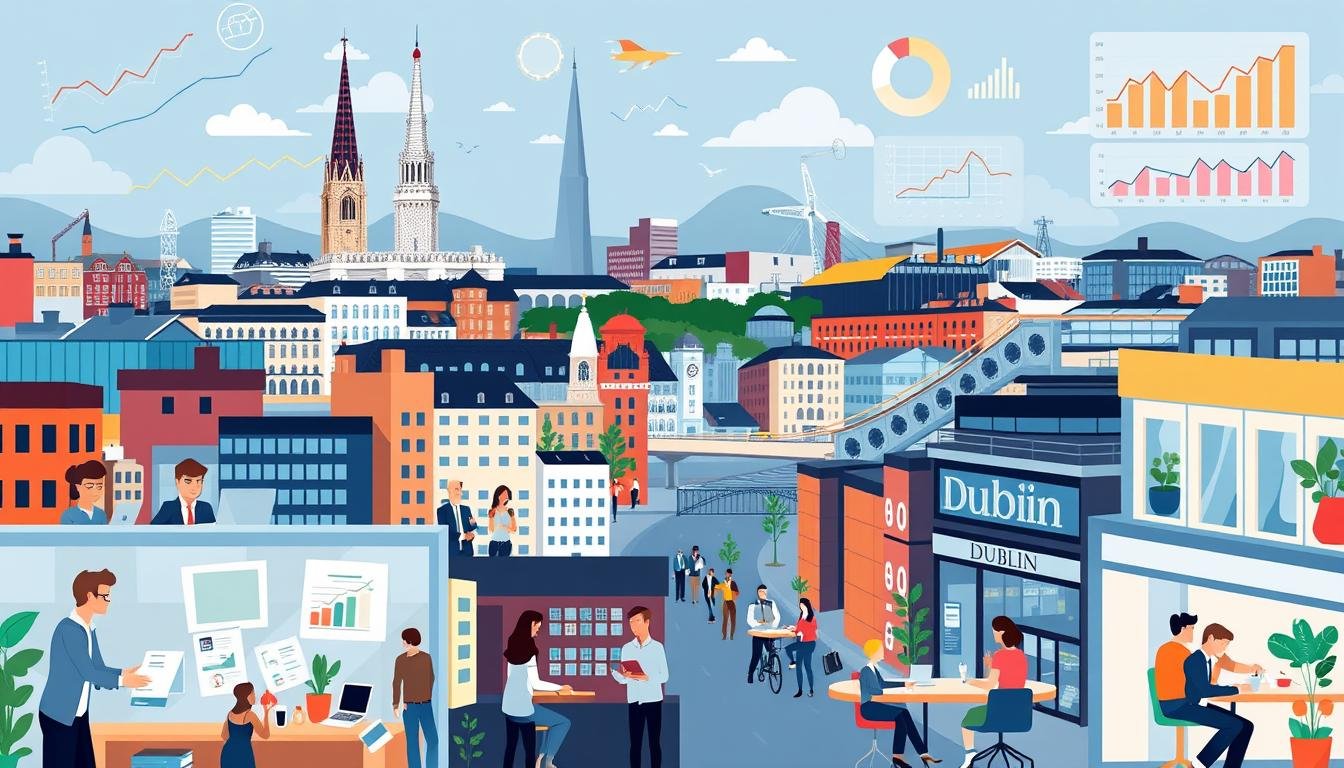Job Market Trends in Ireland: Insights & Outlook
The Irish job market is changing fast, offering new chances and challenges for 2024-2025 masters students. Ireland’s economy is growing, especially in tech, finance, life sciences, and engineering. This means more jobs for skilled people. But what does the future hold for job seekers in Ireland? Are certain industries or roles more promising? And how does the housing crisis and changing work habits affect job hunting?
Key Takeaways
- The Irish job market offers both chances and hurdles for new masters students, with the economy growing in key areas like tech, finance, life sciences, and engineering.
- Even though more people are finding jobs, there’s still a big need for skills in tech, engineering, and finance. This could lead to higher salaries.
- More employers want workers to come to the office, especially in tech. This might be tough for those who like working from home.
- Changes in rules and a focus on being green are creating more jobs in compliance, governance, and ESG reporting.
- New masters students should work on improving in-demand skills, think about contract jobs, and develop strong soft skills to succeed in the changing job market.
Ireland’s Thriving Job Landscape
Ireland’s economy is growing fast, thanks to sectors like finance, technology, and life sciences. The service sector is leading the way, with lots of jobs in tech and hospitality. Unemployment is falling, and more people are finding work.
Economic Growth and Job Creation
The hiring rate for new graduates in Ireland was down just 5.3% in April 2024. This is a big improvement from last year’s 28.7% drop. The job market is getting better, with unemployment at 4.3% now. Wages are slowly going up, too, according to the ESRI.
Service Sector Dominance
The service industry is driving Ireland’s employment growth. Tech, hospitality, and healthcare are creating lots of new jobs. Healthcare is growing the fastest, with jobs for nurses, pharmacists, and physiotherapists in demand.
“The service sector dominates the job market, offering diverse opportunities across key industries like technology and hospitality.”
Industry-Specific Opportunities
Ireland’s job market is booming, with lots of chances in technology, life sciences, and pharmaceuticals. These fields are growing fast because of Ireland’s great location, business-friendly policies, and skilled people.
Technology: A Booming Industry
The technology jobs Ireland market is growing fast. Big names like Google, Microsoft, and Amazon are here, drawing in top talent. They need people skilled in software, cybersecurity, and data analytics.
Life Sciences and Pharmaceuticals
The life sciences careers Ireland and pharmaceutical industry Ireland are also doing well. Companies like Pfizer, MSD, and Allergan are here. They offer jobs in research, development, manufacturing, and more.
Ireland is a great place for businesses in high-demand sectors Ireland. Its friendly business environment, skilled workers, and big European market make it appealing. As the economy keeps growing, the need for skilled workers in these fields will stay high.
Job Market Dynamics
The job market in Ireland is booming, with a record low EU unemployment rate of 6.1% in 2023. This rate is expected to drop to 5.9% by the end of the year. This shows Ireland’s strong economy and job creation efforts. Yet, the job market faces challenges, like skill shortages in key industries.
Skill Shortages and Talent Acquisition Challenges
Ireland’s job rates are rising, but it’s facing a talent shortage in many areas. The tech industry, for example, needs more engineers in validation and automation. There’s also a big demand for data analytics, data science, and agile project management experts.
The life sciences and pharmaceutical sectors are looking for people with skills in microbiology and chemistry method testing. The ongoing accommodation crisis in Ireland makes hiring and integrating overseas talent harder. Companies are focusing on upskilling and reskilling their current staff to fill these gaps.
“Employers in Ireland are facing a significant challenge in finding the right talent to fill critical roles, especially in the technology and life sciences sectors. This skills shortage is exacerbated by the housing crisis, which makes it difficult to attract and retain skilled professionals from abroad.”
To tackle these challenges, employers in Ireland are trying new approaches. They’re using data to improve their hiring, valuing soft skills as much as technical ones. They’re also offering flexible work options to attract and keep the best talent.
Despite these hurdles, Ireland’s job market is still dynamic, offering many chances for skilled workers in various fields. By tackling skill gaps and talent challenges, Ireland aims to stay a top place for global talent.
Career Prospects and Salary Trends
The job market in Ireland is looking good, with the economy growing and more jobs available. Salary trends show that Ireland is a great place to work, with good pay to attract the best people.
The average annual salary in Ireland is about €44,202. The national minimum wage is €11.30 an hour for adults. But, pay can change a lot depending on the job and industry. Jobs like doctors, IT experts, lawyers, and top business leaders pay the most.
The job market outlook is especially bright for tech, life sciences, and renewable energy. These fields are growing fast and offer many career prospects for those with the right skills.
Companies in Ireland are trying to keep the best workers by offering good compensation packages and flexible work. They also help workers learn new skills. This helps businesses grow and keeps Ireland’s economy strong.
“The career prospects in Ireland are incredibly promising, especially for those with in-demand skills and a willingness to adapt to the rapidly evolving job market.”
In summary, Ireland’s job market is dynamic and rewarding. It offers great opportunities for both experienced workers and those just starting their careers.
Hybrid and Remote Work Models
The job market in Ireland is changing fast, with more focus on hybrid and remote work. Recent stats show a big move towards flexible work options. This is due to what employees want and the lasting effects of COVID-19.
Recent data shows that over three-quarters (79%) of employers in Ireland are now offering hybrid working arrangements at their organizations. But, this flexibility comes with a warning. Nearly a third (32%) of employers believe they will need staff to be in the office more often in the future.
Flexible Work Arrangements
The need for hybrid work Ireland and remote work Ireland is still high among professionals. In fact, over half of the workforce surveyed said that a hybrid work model is their preferred working pattern. This move towards more flexible work could change things for employers and employees in the future.
Shift Towards Onsite Work
Even though there’s a trend towards flexible work arrangements Ireland, some employers, especially in tech, want more onsite days. This change might affect those who enjoy the benefits of remote and hybrid work, like better work-life balance and less travel.
As the job market keeps changing, finding the right balance between work needs and employee needs is key. Adapting to these changes will help attract and keep the best talent in Ireland’s competitive job market.
“The number of applications for roles offering a hybrid working model exceeds those for fully office-based roles at CareerWise.”
Job market trends in Ireland
The Irish job market started 2024 with a cautious tone. There’s a big drop in job openings and a sharp fall in job searches. This is due to economic worries and changing job hopes at the start of the year. Yet, with big investments by IDA Ireland, the job scene might bounce back.
These investments could lead to more jobs and growth in areas like finance, life sciences, and tech. Salaries are mostly steady, but some jobs, like Quantity Surveyors and Cybersecurity experts, are in high demand.
More jobs now need people to work on-site, especially in tech. The tech sector wants more permanent workers for digital projects, mainly in Dublin. They’re looking for skills in ERP, HRIS, and AI.
The finance sector in Ireland is also hiring steadily. They need people for roles like Regulatory Compliance Analysts and ESG experts. Dublin is particularly busy with jobs in accounting and finance, especially for Tax Managers.
The legal sector has seen a slight drop in demand, mainly due to slower M&A deals. But, there’s more need for conveyancing lawyers. Life sciences are focusing on contract jobs, especially for QA and QC roles. They’re also investing in training to promote from within.
Engineering is still in high demand, especially for skills in automation and maintenance. As the Irish job market trends and employment landscape change, the workforce dynamics in Ireland are both challenging and full of opportunities. Employers and job seekers need to be flexible and ready to adapt to these changes.
Sustainability and Regulatory Shifts
Ireland’s job market is changing fast, thanks to a growing focus on sustainability and new rules. This means more jobs for people in compliance, governance, risk management, and ESG reporting.
Compliance and Governance Roles
Big companies in Ireland are getting ready for new rules like the Corporate Sustainability Reporting Directive (CSRD) and the Senior Executive Accountability Regime (SEAR). They need experts in compliance and governance to follow these new rules.
ESG Reporting and Risk Management
There’s also a big need for ESG strategy and reporting experts. Companies want to meet new sustainability standards and please investors. The Digital Operational Resilience Act (DORA) is making risk management, analytics, project management, IT, and cybersecurity roles even more important.
These changes in rules and the focus on sustainability have made Ireland’s job market very active. There’s a lot of demand for compliance, governance, ESG reporting, and risk management experts.
“Sustainability and regulatory compliance have become critical priorities for businesses in Ireland, driving the demand for specialized talent in these areas.”
As Ireland keeps up with sustainability trends and regulatory changes, the job market will likely grow. There will be more compliance jobs Ireland and risk management roles Ireland. This offers great career chances for those who can handle these changes.
Top Industries for Graduates
Ireland’s economy is growing strong, offering many job chances for graduates. The best fields include technology, finance, life sciences, and engineering.
Technology and Digital Transformation
The tech scene in Ireland is exploding. It needs experts in software, cybersecurity, and data. Big names like Google, Microsoft, and Apple have big bases here, creating lots of tech jobs.
Financial Services and Accounting
Ireland is a key player in Europe’s finance world. It offers many jobs in banking, investment, accounting, and consulting. The right skills and qualifications open doors in this sector.
Life Sciences and Engineering
Ireland is a hotspot for life sciences, thanks to many pharmaceutical and medical device firms. It also has a lively manufacturing and engineering scene. This means lots of engineering jobs for graduates in areas like mechanical, electrical, and chemical engineering.
In these leading industries, Irish graduates can find exciting and fulfilling careers. The country’s strong economy and welcoming business environment make it a great place for young professionals to start their careers.
Talent Acquisition Strategies
In Ireland’s job market, employers are changing how they find talent. The life sciences sector is using contract hiring more, especially for QA and QC roles. They also focus on internal training to grow talent from within, reducing the need for outside hires.
To attract and retain talented employees, employers offer great benefits and incentives. They provide flexible hours, bonuses, and better parental leave. These talent attraction strategies are key in a tight job market where skilled workers are scarce.
- Shift towards contract hiring, particularly in the life sciences sector
- Internal training and promotion from within as a talent retention strategy
- Competitive benefits and incentives to attract top talent
“By 2025, Millennials are projected to make up 75% of the workforce, highlighting the importance of offering flexible work arrangements and tailored incentives to attract and retain this generation of talent.”
As the job market changes, talent acquisition Ireland is a major focus for employers. By using contract hiring and internal training, and offering great employee benefits, companies can get and keep the skilled workers they need. This helps them succeed in Ireland’s fast-paced business world.
Regional Hiring Trends
In Dublin, the need for accounting and finance experts is still high. But, the job market in other parts of Ireland has seen a drop. This is because some people prefer to stay in their jobs, enjoying better pay and career chances in places outside Dublin.
The construction field, however, is booming. It needs lots of skilled workers like Quantity Surveyors and Project Managers. This is because of big projects happening in cities all over Ireland. Yet, the housing crisis and more job chances abroad are making some locals think about moving overseas. This is changing the job scene in different areas.
“The regional job market in Ireland is evolving, with pockets of growth and decline depending on the industry and location. Professionals are weighing their options, considering factors like salaries, career advancement, and work-life balance when making career decisions.”
The hiring trends in Ireland show the country’s changing regional job market. Some areas have more job openings in certain fields. It’s important for both employers and job seekers to keep up with these changes. This way, they can make the most of the shifting job market and plan their strategies wisely.
Recommendations for Job Seekers
The Irish job market is always changing. Job seekers need to be flexible and improve their skills and expertise. This is important to meet what employers want. Skills like software development, cybersecurity, and data analytics are in high demand. But, having good soft skills like communication and teamwork is also key. Employers now value these skills a lot.
Skill Enhancement and Adaptability
To keep up in the job search, job seekers should keep learning and be ready for new technologies and trends. They can do this by taking online courses, going to workshops, or getting practical experience in their field.
Networking and Industry Connections
Having a strong network and connections in your field is very helpful. It can help you find jobs and learn about new opportunities. Job seekers should go to industry events, join professional groups, and use LinkedIn to meet people and get advice on career advice Ireland.
By improving their skills, being adaptable, and networking, job seekers in Ireland can do well in the thriving job market.
“Continuously upgrading your skills and being open to adapting to new technologies is key to standing out in the Irish job market.”
Conclusion
The Irish job market is changing fast for new masters students in 2024-2025. The economy is strong, with growth in tech, life sciences, and finance. But, there are skill shortages and challenges in finding jobs. To succeed, students need to know the latest trends, improve in-demand skills, and build a strong network.
Key job market trends in Ireland show a thriving economy. Unemployment rates are back to pre-pandemic levels, and jobs are plentiful. Sectors like tech, finance, healthcare, and tourism are growing, offering many career paths. Remote and hybrid work, plus a focus on Diversity, Equity, and Inclusion (DEI), open up new job opportunities.
New masters students need to keep up with these changes and adapt their skills. By using Ireland’s strong job market, embracing new trends, and building a professional network, they can find great opportunities. This will help them advance their careers in Ireland.
Source Links
- Navigating the Irish Job Market: Opportunities and Insights for Masters Graduates (2024-2025) 🇮🇪💼
- No title found
- The 2024 guide to kickstarting your career in Ireland
- Ireland Job Market 2024: Trends, Sectors, & Salaries
- Work in Ireland | Prospects.ac.uk
- Strategies to Find a Job in Ireland: Navigating the Irish Job Market
- Spring/Summer 2024 UK & Ireland Labour Landscape Overview: Exploring Macro Trends
- Hiring Trends Shaping Ireland’s Job Market in 2023
- Explore Top Job Opportunities in Ireland
- The Dublin Job Market: Current Trends and Opportunities | talenthub.ie
- Average Salary in Ireland – Complete Guide 2024 – TimeCamp
- Remote Work Trends in Ireland: The Future of Work
- What the hybrid work model looks like in Ireland [2024] – CareerWise Recruitment
- Ireland Quarterly Employment Monitor: Market sees cautious start to 2024
- Labour market information: Ireland
- Sustainability survey | Deloitte Ireland
- Innopharma Education Blog
- Ireland’s Job Market – Which professional sectors are in high demand? – Bartra Wealth Advisors
- Top recruitment trends shaping Ireland’s job market in 2024
- What are the best practices for talent management in Ireland?
- 5 Talent Acquisition Trends to Watch
- Ireland 2024 Job Market Report
- Minister Burke and Minister McGrath welcome latest figures showing further employment growth in first quarter of 2024
- Irish Job Market Guide To Finding Your Perfect Job
- Morgan McKinley Ireland Quarterly Employment Monitor: Steady Growth in Irish Professional Employment Market
- How to stay aware of job market trends
- The Employment Boom in Ireland
- Top 5 Trends Shaping the Future of Recruitment in Ireland in 2024
- Exploring the Landscape of Job Vacancies in Dublin: Opportunities and Trends








